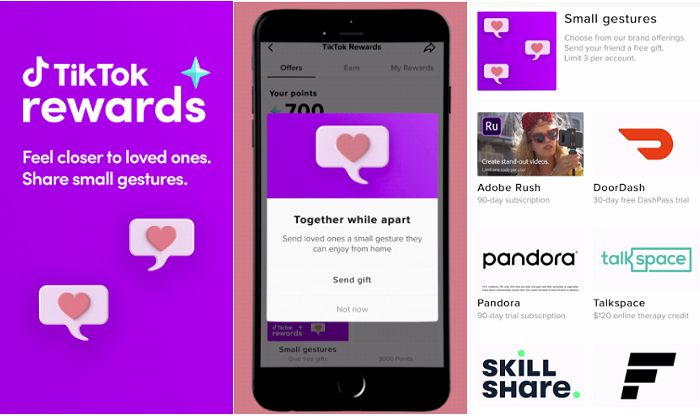SOCIAL
TikTok Tests eCommerce Potential with ‘Small Gestures’ Virtual Gift-Giving Process

TikTok has launched a new initiative called ‘Small Gestures‘ which enables users to send free, virtual gifts from a range of brand partners within the app.

As explained by TikTok:
“By collaborating with our brand partners on this new program, we’re able to give users a platform to feel connected with their friends and family through the small gesture of sending a gift to someone who might need it most. And thanks to our generous partners, these ‘Small Gestures’ are offered free for all TikTok users to send gifts up to three separate times.“
Free? Yes – although the gifts on offer are fairly promotional in nature, without playing down their significance.
Among the gifts available in the app are:
- A 90-day subscription to Adobe Premiere Rush
- 1-month free DashPass subscription
- 90-day trial subscription for Pandora
- 2-month Premium Membership for Skillshare
So, it’s not physical products, they’re the kind of promotional or ‘freemium’ type offers many of these businesses use to get more people onto their books. But still, they are offers nonetheless. And they’re free, so no complaints.
To send a Small Gesture gift, TikTok users need to search ‘Small Gestures’ on the Discover Page in the app. You then need to tap on the purple banner for the program, and from there, you can select the offers you want to send. Tap on the offer, send it via message, and you’re done.
And while the stated aim of the program is to “provide comfort and “thinking of you” reminders to friends and family while we’re apart”, another element at play here is TikTok’s gradual evolution into eCommerce.
As we’ve noted previously, short-form video is notoriously difficult to monetize, with virtually no capacity for interruptive ads, and pre-roll promotions easy to skip. That means that TikTok needs to look to alternate promotion options, to both monetize for its own revenue purposes, and also to provide income streams for top creators.
In China, the Chinese version of the app, called ‘Douyin’, has seen significant monetization success via eCommerce integrations in the app.

Douyin reportedly generated over $122 million in revenue last year, mostly generated by eCommerce – which is more than 2x what TikTok brought in. And it’s clear from TikTok’s approach that this is also where it’s headed.
Already we’ve seen TikTok testing out its own eCommerce tools and external linking options in order to provide more revenue generation options for creators, while it’s also launched an influencer marketplace to promote this element.

TikTok is also promoting influencers as a more effective outreach option via its own TikTok ads posts.
That makes sense, but it will take more work, and involve a lot more complexity, for TikTok to establish an effective revenue generation stream through UGC and eCommerce integrations than it would to simply insert ads.
That means that it’ll take time, and the longer it takes, the more potential that some of the platform’s top creators will drift off to YouTube and Facebook instead, where they can make big money straight away. And with YouTube also looking to build its own TikTok clone, that could be problematic – unless TikTok can establish its next stage faster.
Which, maybe the ‘Small Gestures’ process will assist with.
If TikTok can start to establish transactional processes on the platform, that could help to lead users into new habitual behaviors, which will then connect into its eCommerce push. It’s essentially expanding on the activities that users can undertake within the app – you start with virtual gifts, then the transition into real, purchased gifts feels more natural, and makes more sense within the context of the app.
It’s a small part of the process, for sure, but it provides enhanced promotional opportunities for partner brands right now, while working to highlight the potential of the same systems for the next phase of direct shopping in the app.
As such, it’s a clever promotion from TikTok, and it may help to shape the next phase for the platform.
The ‘Small Gestures’ initiative is currently only available to US users.
